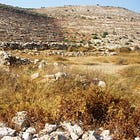Healthy Jew Politics (Part 2)
Were you at Mount Sinai this week 3336 years ago? You're eligible for the crown of Torah.
Dear Healthy Jew,
Last week we learned the story of Achiya of Shiloh (Ahijah the Shilonite), the biblical prophet who presided over two pivotal moments in Jewish history:
The crowning of Jeroboam as king over 10 of Israel’s tribes, leaving only 2 for the Davidic dynasty after the generation of Solomon.
The separation of the Torah’s study and transmission from politics. No matter how far our society’s institutions fall - even the religious ones - Torah and the Jewish people will survive independently.
We wondered: who invested Achiya with the authority to detach the spiritual heart of Israel from its leaders on the ground?
The Crown of Crowns
Achiya’s revolution, it seems to me, was built on the ancient tradition of the Jewish nation’s 3 crowns.
In Maimonides’ words:
Israel received three crowns: Torah, kehunah, and monarchy.
Aaron acquired the crown of kehunah, as is written “And it will be for him and his descendants, a convent of kehuna forever (Numbers 25:13)”.
David aquired the crown of monarchy, as is written (Psalms 89:37), “His descendants will always be [kings], and his throne like the sun before me.”
The crown of Torah, however, is open and ready for anyone, as is written (Deuteronomy 33:4) “Moshe instructed the Torah to us, the heritage of the congregation of Yaakov.” Anyone who wants can come and take it.1
Everyone who learned Torah from Moses at Sinai - that is, every Jew - can earn the crown of Torah. In fact, continues the Rambam, the Torah’s crown is greater than those of kehuna and monarchy, as the verse in Proverbs (8:15) (written by Solomon, of all people!) taught that all other crowns stem from the Torah: “With me [the Torah] kings are crowned…”
When the Jewish people live by the crown of Torah, the Torah extends to crown the kings and kohanim who integrate Torah life into the Jewish nation’s politics and cultural. For our nation to function effectively, we need all 3 “crowns,” or institutions, working together, because each plays a special role in building a healthy Jewish society around knowing God and emulating God’s ways.
Separation of Church and State
Unfortunately, for much of history the crowns of kehunah and monarchy have been either corrupted or lost:
Many First Temple Period monarchies worshiped idols instead of God.
The Second Temple Period kohanim crowned themselves kings and drowned in corruption as the Roman legions degraded and ultimately destroyed Jerusalem.
For almost 2,000 years of exile, Jews lived outside of political history, and the kohanim’s Temple service were but a distant dream.
Today we’re back in Israel, but with secular political leadership and a beautiful golden mosque on the Temple Mount.
If Achiya of Shilo hadn’t separated the crown of Torah from the kehuna and kings, we would have nothing today to hold us together as God’s chosen nation. We would have long rotted away together with our once-thriving institutions.
But because thousands of Jews always show up to acquire Torah’s internal crown, our nation survives and flourishes while our two external crowns are completely hidden. The Torah’s crown will never be corrupted by power or prestige, because it doesn’t play politics.
Achiya taught separation of church and state - not in the modern sense that politics are free from religion, but that Judaism’s spiritual leadership transcends political power, and can live and thrive in its absence.
Anyone can own the crown of Torah by diligent and sincere study - even if they’re hiding from Israel’s king who wants to kill them (like Elijah) - because Torah nobility is formed in the study hall, not in the king’s court or the Temple’s courtyard.
Jeroboam’s Failed Mission
Keeping this in mind, let’s return to the biblical story of Achiya and Jeroboam.
Achiya met Jeroboam to crown him, I Kings tells us, in a field “outside of Jerusalem.” Hear the nuance: they left Jerusalem’s kings and kohanim behind them, and set out to create a new crown.
Achiya didn’t just inaugurate Jeroboam and go home. Their fateful encounter was designed to create a new type of king, the “monarchy of Israel,” that is the kings who derive their authority from the nation of Israel itself. Jeroboam wasn’t meant to replace the Davidic dynasty, but to show that every Jew can earn the Torah’s crown.
How do I know that Jeroboam’s crowning ceremony was about the crown of Torah?
From the Talmud’s biblical exegesis on their meeting:
“He was wearing a new garment” - Just as a new garment has no blemish, so too Jeroboam’s Torah had no blemish. Another explanation: they said original Torah insights that nobody had ever heard.
“They were both alone in the field” - All the Torah scholars were like blades of grass before them. Another explanation: all the depths of the Torah were open to them like a field. (Sanhedrin 102a)
With these teachings, the Talmud reveals Achiya’s pivotal role Jewish history, a role that Jeroboam was supposed to expand into a kingdom that derives its authority directly from the crown of Torah that every Jew received at Sinai.
Unfortunately, instead of drawing Israel together around studying God’s Torah, he turned them away from God toward his own golden calves. Jeroboam went down in history as the quintessential inciter of the masses to sin, one of the worst titles a person can get.2
If Not Jeroboam, Then Elijah, Elisha, and You
And yet. Even after Achiya predicted the annihilation of Jeroboam’s family, Achiya didn’t walk it all back and return the Oral Torah’s transmission to the kings and kohanim of Jerusalem.
Quite the opposite: he expanded the Torah’s crown reach even farther by transmitting the job of “Torah copier” to the unknown Elijah who hailed from Gil’ad. Gil’ad is the farthest possible location from Jerusalem in every way: it’s in Israel’s northeastern corner, in the secondary Ever Hayarden region, and the Talmud reports that it was rife with murderers.
Elijah then clashed with the wayward king of Israel, Ahab, but never wielded any political power, and there is no record of him even stepping foot in Jerusalem.
Achiya transferred the Torah outside of “the establishment.” Torah doesn’t even need an establishment to exist, because it crowns anyone who comes to study sincerely.
Achiya, Elijah, and all the prophets and sages after them ensure that the Jewish nation will endure forever, because even in the depths of exile we never lose the crown of Torah.
Hey, since you’ve showed up these past two weeks to learn the Torah teachings of Achiya of Shilo, you’ve already earned a little piece of your crown of Torah.
In Part 3, we’ll conclude this series with how Achiya of Shilo taught why and how we avoid political conflict here at Healthy Jew, even though we cover many controversial subjects.
Thank you for reading Healthy Jew.
Here are 2 great paths to continue the journey:
Also check out this intro and index to explore hundreds of posts about our 3 Healthy Jew topics: Wellness with Wisdom, Land of Life (Israel), and Sensible Spirituality.
Finally, always feel free to reach out here with any comments, questions, or complaints:
I look forward to hearing from you!
Be well,
Rabbi Shmuel Chaim Naiman
Rambam Hilchos Talmud Torah 3:1
See Rambam Hilchos Teshuva 3:10









Yes. I was there with every Jew that was or will exist. When Hashem offered the Torah to the Jewish people, their immediate response was “Na’aseh venishma” — “We will do and we will hear.”